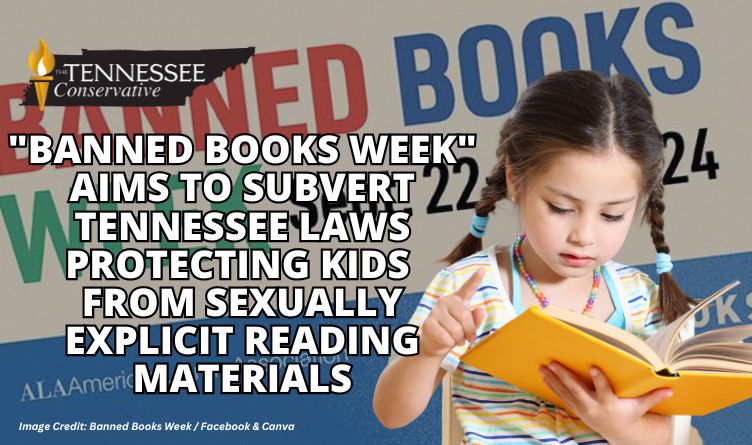Image Credit: Banned Books Week / Facebook & Canva
The Tennessee Conservative [By Olivia Lupia] –
September 28th was the final day of an annual event titled Banned Books Week, which aimed to highlight the “value of free and open access to information and brings together the entire book community — librarians, educators, authors, publishers, booksellers, and readers of all types — in shared support of the freedom to seek and to express ideas.” Namely, to promote books that have been removed from school and public libraries under laws that require sexually explicit and overly violent content to become inaccessible to children.
Tennessee’s version of this law went into effect earlier in the year and requires that library collections be suitable for the age and maturity of students who can access them. It also mandates that a list of all materials in a school library must be maintained and posted to the school’s website, and school governing bodies must adopt policies for reviewing the collections.

Launched in 1982 and supported by a coalition of organizations including the American Library Association and Penguin Random House publishing, Banned Books Week has its own website, schedule of events, and a list of the top ten most challenged books across the nation for the past year. Along with books featuring sexually explicit material, many of the books on the top ten list are focused on LGBT+ subject matter and ideology with titles like Gender Queer and This Book is Gay.
Little Free Libraries, another Banned Books Week partner, has 1,369 locations in Tennessee alone and has launched an interactive map displaying all little library locations across the country, overlaid with the number of book ban attempts in each state.
According to Little Free Libraries Executive Director Greig Meitzer, the library network perfectly reflects the ideals and goals of Banned Books Week as, “the fight to protect free literary access is a fundamental First Amendment issue.”
Leigh Singleton, a Nashville resident known in her neighborhood for her annual “Parlor of Peril” haunted house each year where she dresses as an alter ego and reads palms, has spent 12 years curating the little library on her block. It is permanently called a Little Free Haunted Library and “boasts ghosts and ghouls year-round.”
She believes, “It’s so important for people to be able to read what’s out there, and not have other people telling them what is appropriate and what is not appropriate other than your parents. It’s frightening when you see people start banning books in schools and libraries, or even attempting to.”

The Nashville public library has even leveraged this pushback effort into a marketing campaign by offering library cards that say, “I read banned books.” It began as a temporary effort, but with over 4,200 participants has now become a permanent offering.
Jennifer Edwards, a resident of Murfreesboro advocating for teens to have access to titles like Beloved, a story about sexual violence and American slavery, says “to restrict literary genius…doesn’t make sense to me.”
Other advocates opposed to “book banning” have raised seemingly illogical questions regarding specific definitions in the law, for example, if books with nude statues are considered “explicit” or how much violence is “excess” and claim they will continue to fight Tennessee restriction laws and bans up to the Supreme Court if necessary.


Olivia Lupia is a political refugee from Colorado who now calls Tennessee home. A proud follower of Christ, she views all political happenings through a Biblical lens and aims to utilize her knowledge and experience to educate and equip others. Olivia is an outspoken conservative who has run for local office, managed campaigns, and been highly involved with state & local GOPs, state legislatures, and other grassroots organizations and movements. Olivia can be reached at olivia@tennesseeconservativenews.com.



7 Responses
If you don’t want your little children reading books you don’t like, don’t take them to the library. Problem solved. Many parents are more open-minded. LGBTQ people are part of the fabric of American life. You won’t be able to shield your kids from this forever.
Are you in favor of public schools teaching kids to be nazis, white supremacists, perverts, strippers, or Drag Queens?
I’m opposed to that and I think most people are.
Parents can buy any book they want and let their kids read it at home.
The idea of public schools teaching kids to be nazis, white supremacists, perverts, strippers, or Drag Queens is disgusting and is why the Dems need to be defeated.
The Dems are the ones who want to repeal the First Amendment, not conservatives.
P.S., The conservatives I know do NOT hate gay people – most have gay people in their family. There are 4 gay people that I know of on Fox news. The argument that Libs oppose banning any book is not true. Surely you wouldn’t allow books that teach kids to be racists or to hate LGBTQ people or to brainwash kids in favor of or to oppose a specific religion. So the idea that Libs wouldn’t ban any book from a public school library is not true.
Conservatives have the right to monitor what young kids are viewing, even in a public setting like a library. A library is supposed to be a place to learn and study, not a forum to push specific ideologies. If it was a place for specific ideologies, I’m sure there would be rabid protests outside if there were hundreds of Bibles and Bible stories strewn all over the library. One question that’s on all our minds – why is it so important that drag queens want an audience with young children and the lgbt group needs to have their books thrown in our faces at every turn? Conservatives and Christians have become the targeted group as of recent and it’s not this group protesting violently in the streets.
I find it interesting that the first comment stated that if we don’t like what’s happening at the library, we could just not show up. Problem solved. The library is a public entity for learning and studying for all. That comment shows me how entitled some think they are, that if rules are not the way they want them, we mut be penalized and excluded from society. It doesn’t work like that – especially when my taxes pay for that “public” space.
Nobody is banning books. If you want your porn, you can have your porn. Just keep it away from other people’s kids.
We also must be aware that this same ideology is simultaneously rewriting classics from authors that have been loved by families and children for hundreds of years.
“Modern” “updated” versions of the works of many of these authors are already appearing in digital form across the internet. Attempts as well, are slowly being made to make it impossible to find the original versions and print form.